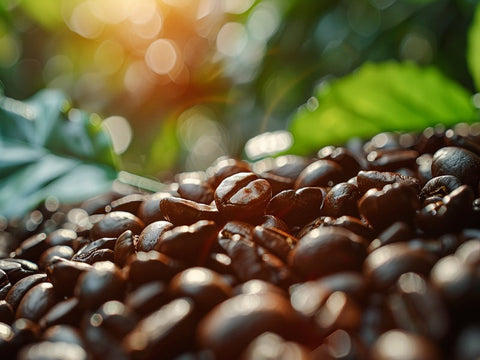Colombian coffee is renowned worldwide for its superior quality and unique flavors. It is grown in the mountainous regions of Colombia, a country located in the northern part of South America. Colombian coffee has become an integral part of the country's culture and economy, making it a must-try for coffee lovers.
What sets Colombian coffee apart is its strict standards and regulations, which ensure only the highest quality beans are produced. According to a study by the International Coffee Organization, Colombia is the third-largest coffee producer in the world.
The production process of Colombian coffee is meticulous and requires skilled farmers who are well-versed in the coffee cultivation techniques passed down through generations. The coffee is handpicked, and the beans are carefully selected, washed, and dried before being exported all over the world. Colombia has various coffee-producing regions, each with its distinct characteristics and flavors.
There are several varieties of Colombian coffee, with the most popular being the Arabica beans known for their smooth and mild flavor. The flavor and aroma profile of Colombian coffee varies depending on the region, altitude, and roasting process.

Colombian coffee is available in different roasts, including light, medium, and dark. Each roast offers a unique taste and aroma, with light roasts being more acidic and dark roasts having a more intense flavor. There are also various brewing methods for Colombian coffee, such as pour-over, French press, and espresso.
Aside from its delicious taste, Colombian coffee also offers numerous health benefits. It contains antioxidants, can boost energy levels, and has been linked to reducing the risk of several diseases.
The cultural and social significance of Colombian coffee is evident in the traditions and rituals surrounding its consumption. It is a symbol of hospitality and is often served during family gatherings and social events. The coffee industry also plays a significant role in the country's economy, providing employment opportunities and contributing to Colombia's GDP.
To truly appreciate a cup of Colombian coffee, one must take the time to savor its flavors and aromas. It is best enjoyed slowly, preferably with a pastry or traditional snack. Whether you visit Colombia or try it at home, experiencing Colombian coffee is an essential part of understanding the country's culture and history.
Key Takeaways:
What is Colombian Coffee?
Colombian coffee, also known as coffee beans grown in Colombia's ideal climate and rich volcanic soil, is renowned for its mild flavor and balanced acidity. It is often considered one of the finest coffees globally and is a favorite among coffee enthusiasts due to its smooth, mild taste.
Fun fact: Colombia is the third-largest coffee producer in the world, following Brazil and Vietnam.
What Makes Colombian Coffee Unique?
Colombian coffee is renowned for its unique characteristics, thanks to its ideal geographical location, fertile volcanic soil, and diverse climate. These factors come together to produce beans with a well-balanced acidity, a rich full-bodied flavor, and a distinctly mild taste.
The coffee's distinctiveness also lies in the traditional growing and harvesting techniques that have been passed down through generations, ensuring the production of high-quality beans. To truly appreciate the uniqueness of Colombian coffee, it is worth exploring various roasts and brewing methods to fully savor its diverse flavors and aromas.
How is Colombian Coffee Produced?

- Planting: Colombian coffee is produced by planting coffee seeds in shaded nurseries until they sprout.
- Transplanting: The sprouted seeds are transplanted to large fields with specific soil and climate conditions.
- Cultivation: The coffee plants are carefully cultivated, requiring regular watering and pruning.
- Harvesting: Skilled workers handpick the ripe coffee cherries during the harvesting season.
- Processing: The harvested cherries are processed to remove the pulp and extract the coffee beans.
- Drying: The extracted coffee beans are dried to the optimal moisture content.
Fun Fact: Colombian coffee is known for its high quality and unique flavor profile due to the country's diverse microclimates.
Read: Bean Journey Discovering Where Coffee Beans Come From
What are the Different Regions of Colombian Coffee Production?
Colombian coffee production is known for its diverse regions, such as Medellin, Bucaramanga, and Armenia. The unique climate and altitude of each region greatly impact the beans, resulting in distinct flavors and aromas.
For an authentic experience, one can explore the rich coffee culture by visiting these regions or trying coffee from each area through specialty roasters.
What are the Different Varieties of Colombian Coffee?
Colombian coffee boasts a range of distinct varieties, each known for their unique flavors and characteristics. These varieties, including Bourbon, Typica, Caturra, and Maragogipe, are cultivated in various regions of Colombia, adding to the diverse and high-quality selection of Colombian coffee.
What are the Flavors and Aromas of Colombian Coffee?
What are the flavors and aromas of Colombian coffee?
| Flavors | Aromas |
| Fruity | Bright |
| Nutty | Floral |
| Cocoa-like | Citrusy |
| Caramel | Chocolatey |
When exploring Colombian coffee, expect a delightful balance of fruity and nutty flavors combined with bright and floral aromas. Try different roasts to experience the diverse range of flavors and aromas that Colombian coffee has to offer.
Read: How To: Learn To Taste Coffee!
What are the Different Roasts of Colombian Coffee?
Colombian coffee offers a variety of roasts, including:
- Light, which preserves the original flavors of the beans.
- Medium, which offers a balanced flavor and acidity.
- Dark, which provides a bold and smoky taste.
What are the Different Brewing Methods for Colombian Coffee?

When it comes to Colombian coffee, there are various brewing methods that can bring out its rich flavors. These methods include:
- Drip or Filter: This method is ideal for showcasing the coffee's balanced flavors.
- French Press: Enhances the coffee's full body and robust taste.
- Espresso: Offers a concentrated and bold flavor experience.
- AeroPress: Showcases the coffee's bright acidity and clarity of flavors.
To truly savor Colombian coffee, it is worth exploring these methods and finding the one that best suits your taste preferences and brewing convenience.
What are the Health Benefits of Drinking Colombian Coffee?
Drinking Colombian coffee not only offers a deliciously rich and flavorful experience, but also numerous health benefits. Some of these benefits include:
- Improved cognitive function
- Enhanced physical performance
- A reduced risk of certain diseases
The high levels of antioxidants found in Colombian coffee contribute to its health-promoting properties, supporting heart health and aiding in weight management. Furthermore, moderate consumption of Colombian coffee can also elevate mood and increase alertness. For optimal health benefits, it is recommended to choose organic Colombian coffee to avoid potential exposure to harmful chemicals.
What are the Cultural and Social Significance of Colombian Coffee?
The cultural and social significance of Colombian coffee is multifaceted. It serves as a powerful symbol of national identity and pride, representing the country's rich coffee-growing heritage and the tireless efforts of local farmers. Furthermore, it promotes communal gatherings, such as traditional coffee ceremonies, and plays a crucial role in supporting the economy by providing livelihoods for countless individuals and communities.
What are the Traditions and Rituals Surrounding Colombian Coffee?
Colombian coffee is more than just a beverage, it holds deep cultural significance and is often the focal point of social gatherings. The coffee tradition in Colombia involves elaborate ceremonies and rituals, including the traditional preparation of 'tinto,' a small but strong black coffee served in tiny cups. These coffee gatherings are not just a way to enjoy a cup of coffee, but also a symbol of hospitality and warmth, promoting conversations and connections.
The coffee culture in Colombia is deeply rooted in tradition and community, making it a unique and enriching experience for both locals and visitors.
How Does Colombian Coffee Impact the Economy and Society of Colombia?
- Economic impact: Colombian coffee plays a crucial role in contributing to Colombia's economy, providing employment and income for thousands of workers.
- Social significance: Coffee is deeply ingrained in Colombia's cultural heritage, shaping traditions and rituals, and fostering a sense of community.
- Sustainable development: Coffee production promotes environmental stewardship and ethical trade practices, leading to social and economic development in rural areas.
- International trade: Colombian coffee is a significant player in global trade, strengthening Colombia's international economic relations and enhancing its global reputation.
How to Properly Enjoy a Cup of Colombian Coffee?
- Grind and Brew Fresh: Grind coffee beans just before brewing for maximum freshness.
- Use Filtered Water: Ensure high-quality water to avoid altering the coffee's flavor.
- Proper Brewing: Follow recommended brewing methods to extract the best flavors.
- Serve in a Preheated Cup: Maintain the coffee's temperature by using a preheated cup.
- Savor the Aroma: Inhale the rich aroma before taking the first sip.
- Sip Slowly: Enjoy the flavors and complexities by sipping slowly.
- Pair with Complementary Flavors: Pair your cup of Colombian coffee with chocolate or pastries to enhance the overall experience.
How to Properly Enjoy a Cup of Colombian Coffee?
- To properly enjoy a cup of Colombian coffee, start by grinding the coffee beans just before brewing to preserve freshness and aroma.
- Next, use fresh, cold, filtered water to brew the coffee, ensuring the best flavor extraction.
- Before taking a sip, take a moment to enjoy the aroma and allow it to enhance the tasting experience.
- Sip slowly to fully savor the flavors and complexities of the coffee.
- For a delicious pairing, enjoy your Colombian coffee with a piece of dark chocolate to complement its rich and robust flavors.
For an authentic experience, consider learning about the coffee's origin and the production process while enjoying your cup of Colombian coffee.
Frequently Asked Questions

What makes Colombian coffee unique and sought after by coffee lovers around the world?
Colombian coffee is known for its rich flavor profiles and high quality production methods, making it a favorite brew among java aficionados. The beans are predominantly Arabica and grown in the Coffee Triangle region, which has a prime location with varied altitudes and volcanic soil that produces flavorful beans with a vibrant acidity.
What is the history and journey of discovery behind Colombian coffee?
Colombian coffee has a rich heritage dating back to the 18th century when Jesuit priests brought Arabica beans from Venezuela and planted them in Bogotá. The early cultivation and exportation were done through small-scale farming, but commercial plantations emerged in the early 20th century due to increased demand. Today, Colombia is one of the largest producers of coffee in the world and a major player in the global market.
What are the traditional brewing methods used for making Colombian coffee?
One of the traditional brewing methods for Colombian coffee is 'Chorreador', which involves using a wooden stand and cloth filter to pour hot water over freshly ground beans. Other popular methods include pour over and French press, which bring out the chocolatey sweetness and fruity acidity of the beans.
How has Colombian coffee culture impacted local communities and traditions?
Coffee plays a significant role in shaping Colombian culture and is a vital source of income for rural communities. The coffee industry's expansion and modernization have not only brought international recognition but also provided employment opportunities for Colombian farmers. Additionally, coffee shops serve as social gathering spaces for people to relax and socialize, reflecting the importance of coffee in Colombian traditions.
What sets Colombian coffee apart from its main competitor, Brazilian coffee?
Despite Brazil dominating global coffee exports, Colombian coffee remains popular for its consistent quality and unique flavor profile. While both countries have rich coffee traditions, Colombia's prime location, varied altitudes, and volcanic soil give its beans a distinctive flavor that is sought after by international consumers.
What is the best way to experience an authentic Colombian coffee experience in North America?
Mecatos Bakery and Cafe in Orlando, Florida, is a family-owned business that brings the authentic taste and aroma of Colombian coffee to the United States. The cafe offers a variety of traditional Colombian drinks and snacks, sourced directly from local farms in Colombia to ensure the highest quality. It provides a complete Colombian experience, from the coffee to the atmosphere, making it a must-visit for any coffee lover or fan of Colombian culture.


